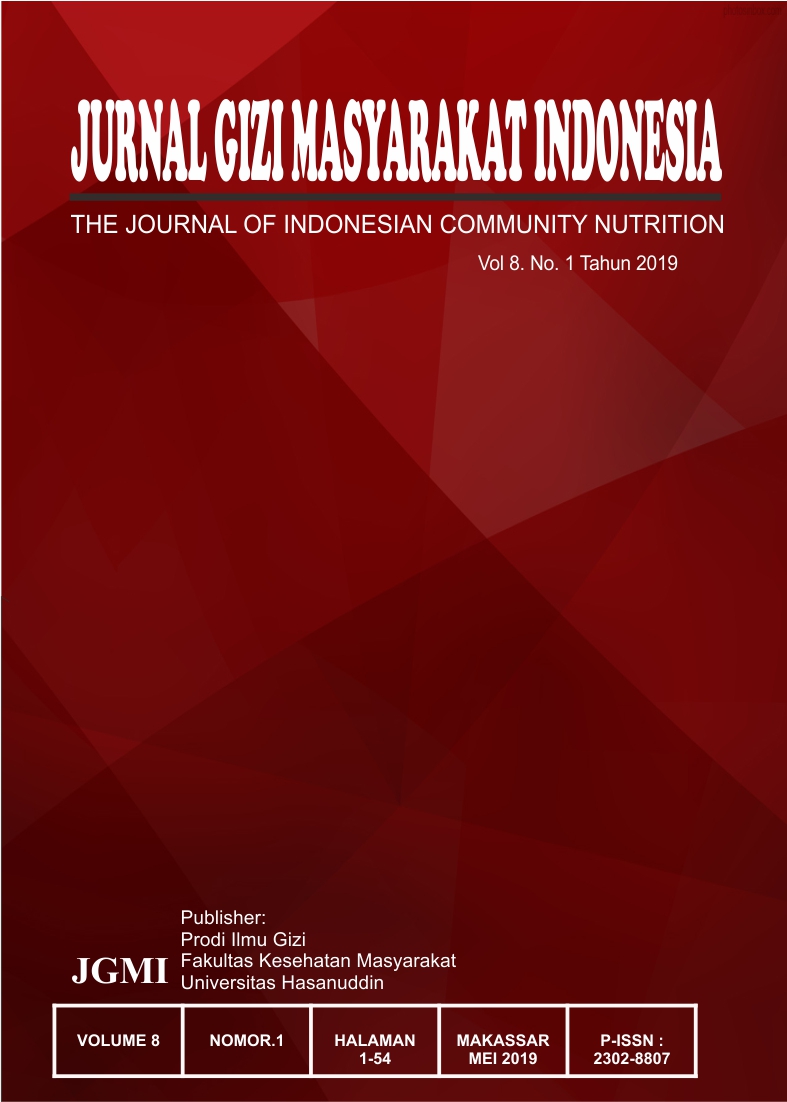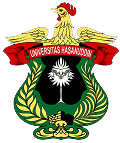GAMBARAN KEJADIAN KECACINGAN (SOIL TRANSMITTED HELMINTH), ASUPAN VITAMIN B12 DAN VITAMIN C PADA ANAK USIA SEKOLAH DASAR DI KOTA MAKASSAR
DOI:
https://doi.org/10.30597/jgmi.v8i1.7374Abstract
Introduction: Worm infections will affect the intake, digestion, absorption, and metabolism of food.Worm infection can cause nutritional deficiencies in the form of calories, protein, and vitamins andblood loss which results in a decrease in endurance and cause disruption to child development.Objective: This study aims to describe the incidence of helminthiasis (soil transmitted helminth),intake of vitamin B12 and vitamin C in primary school-aged children in Makassar City. Materials andMethods: The type of research used is descriptive. Sampling was carried out using proportionalrandom sampling with a sample of 88 people in Makassar City representing the Manggala Districtarea namely SD Borong Jambu III Inpres and SD Inpres Perumnas Antang II / I and Tallo Districtnamely Rappokalling 67 Elementary School and Kaluku Bodoa Inpres Elementary School. Datacollection on children's characteristics was carried out by interviewing questionnaires and intakeusing a 2 × 24 hour food recall method, worm examination performed with the Kato Katz technique.Descriptive analysis was carried out using the SPSS application. Results: A total of 15.9% of childrenhad helminthiasis. Children who were positive for helminthiasis were more prevalent in male sexes,namely (22.9%) aged 10 years as much (17.6%) and living in coastal areas as much (23.3%). VitaminB12 intake showed more children who had more helminthiasis with adequate vitamin B12 intake whichwas as much as (85.7%). Whereas the status of helminthiasis based on vitamin C intake shows thatchildren who are positive have more worms with less vitamin C intake which is as much as (100%).Conclusions and Suggestions: Suggestions for the community, especially mothers and children, tomaintain home environmental sanitation, as well as the importance of consuming nutritious foodDownloads
References
WHO.
Soil
Transmitted
Helminth
Infection.
[Internet].
Available
from:
ttps://www.who.int/news-room/fact-sheet/detail/soil-trasmitted-helmint-infections.
Anggraheni N, and Pramono A. Gambaran Kadar Serum Seng (Zn) dengan Z-Score Pada
Anak Usia 9-12 Tahun (Studi Penelitian Di SDI Taqwiyatul Wathon Semarang Utara).
Journal Of Nutrition College. 2015; 4(2): 557-561.
Amaliah ATR, Azriful. Distribusi Spasial Kasus Kecacingan ( Ascaris lumbricoides )
Terhadap Personal Higiene Anak Balita di Pulau Kodingareng Kecamatan Ujung Tanah Kota
Makassar Tahun 2016. Higiene. 2016;2(2).
Aina, M., & Dawam S. Uji Kualitatif Vitamin C Pada Berbagai Makanan dan Pengaruhnya
Terhadap Pemanasan. Jurnal Kesehatan Masyarakat Indonesia. 2016; 1 1(1):61-67.
Almatsier. Prinsip Dasar Ilmu Gizi. Utama. PGP, editor. Jakarta; 2010.
Lestari, T. W. Hubungan Tingkat Pengetahuan, Sikap dan Perilaku Pencegahan Kecacingan
dengan Status Kecacingan Siswa SDN 03 Pontianak Timur Kotamadya Pontianak Tahun
Program Studi Pendidikan Dokter Fakultas Kedokteran Universitas Tanjungpura,
;1-8.
Nurhalina, Desyana. Gambaran Infeksi Kecacingan pada Siswa SDN 1-4 Desa Muara Laung
Kabupaten Murung Raya Provinsi Kalimantan Tengah Tahun 2017. Jurnal Surya Medika.
;3(2):3-10.
Faridan K, Marlinae L, Audhah N Al. Faktor-faktor yang berhubungan dengan kejadian
kecacingan pada siswa Sekolah Dasar Negeri Cempaka 1 Kota Banjarbaru. J Epidemiol dan
Penyakit Bersumber Binatang. 2013;4(3):121–7.
Risma. Hubungan Status Sosial Ekonomi Dengan Kejadian Kecacingan Pada Siswa Sekolah
Dasar Di Makassar Sulawesi Selatan. Skripsi. Fakultas Kedokteran . Universitas Hasanuddin;
Samudar N, Hadju V, Jafar N. Hubungan Infeksi Kecacingan Dengan Status Hemoglobin
Pada Anak Sekolah Dasar Diwilayah Pesisir Kota Makassar Propinsi Sulawesi Selatan Tahun
Ilmu Gizi Fakultas Kesehatan Masyarakan Universitas Hasanuddin. 2013;1–12.
Ahdal, M. T., Sirajuddin, S. dan Alharini, S. Hubungan Infeksi Kecacingan Dengan Status
Gizi Pada Anak SDN Cambaya Di Wilayah Pesisir Kota Makassar. Universitas Hasanuddin
Fakultas Kesehatan Masyarakat.2014;1(1);1-4
Ulayya T, Candra A, Fitrianti DY. Hubungan Asupan Protein, Zat Besi, dan Seng Dengan
Kejadian Infeksi Kecacingan Pada Balita Di Kota Semarang. J Nutr Coll. 2018;7(4):177–85.












